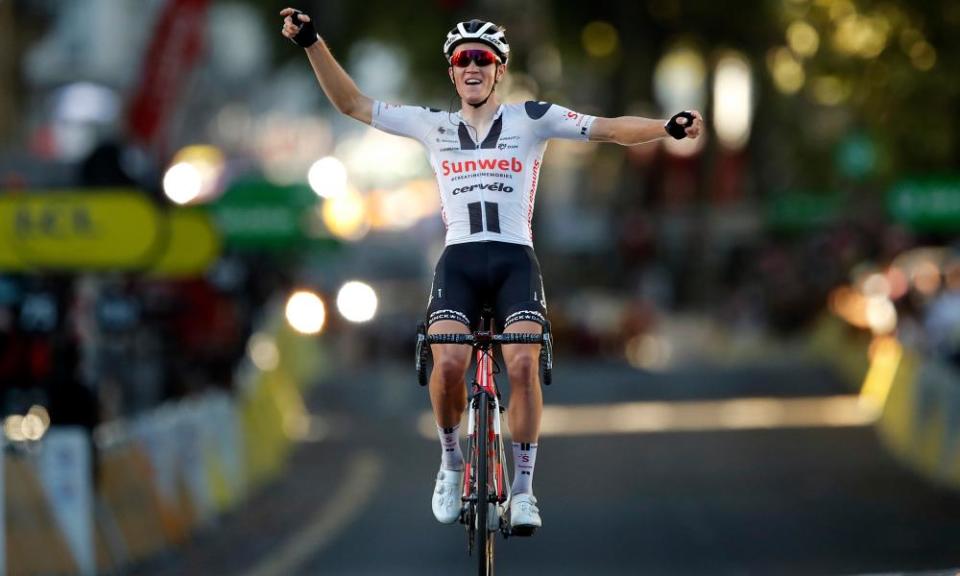Andersen denies Sagan on stage 14 overshadowed by Bardet blow

Rider safety came the forefront of the Tour after it was revealed Romain Bardet, concussed after crashing at speed on Friday, may have finished the stage to Puy Mary suffering from what the rider called a “small brain haemorrhage”.
Bardet, who had started stage 13 in fourth place overall, left the race that evening due to concussion and underwent MRI scans on Saturday morning. “I’m still having nausea and headaches,” Bardet wrote on social media, “and the MRI performed this morning confirmed a small haemorrhage from the concussion.”
However, confusion surrounded Bardet’s exact condition as he later removed the word haemorrhage from the post.
Related: Romain Bardet quits Tour de France with concussion after stage 13 crash
The Frenchman had staggered and fallen before remounting his bike, yet still continued in the mountain stage through the Auvergne and Cantal.
“That was clearly a concussion,” said his former AG2R La Mondiale teammate Jean-Christophe Péraud, second in the 2014 Tour. “It’s easy with hindsight, but it’s clear he shouldn’t have been allowed to continue.”
On the road, Saturday’s gruelling 14th stage, including five categorised climbs, proved challenging for Ireland’s Sam Bennett, whose hopes of another stage win evaporated on the steepest sections of the Col du Béal as Peter Sagan’s Bora Hansgrohe team took the opportunity to distance the Deceuninck-QuickStep rider.
As they did on stage seven to Lavaur, when crosswinds split the peloton, Sagan and his teammates drove home their advantage on the hilly approach to Lyon, knowing a stage win for the Slovak, worth 50 points, would rekindle his hopes in the points classification, currently led by Bennett.
With the peloton split into two large groups, Jumbo-Visma and Ineos Grenadiers moved to the front of the lead group, as a spate of attacks in the suburbs of the city led to Soren Kragh Andersen of Team Sunweb slipping clear to claim his first Tour stage win.
Sagan took fourth place in the group sprint behind the Dane to reduce his deficit in the points classification to 42 points, although given his climbing form, Bennett’s biggest worry now may be the razor‑tooth profile of the final week’s Alpine stages.
But the controversy over the decision to allow Bardet to ride almost 90km with concussion overshadowed the racing. On Saturday morning, his team’s sports director, Julien Jurdie, said Bardet was still suffering from headaches and was “clearly not capable of cycling right now”.
One of Jonathan Vaughters’s former riders, Tom Skujins, now with Trek Segafredo, was at the centre of a notorious incident in the 2017 Tour of California when he remounted and rode on, clearly suffering concussion after a high-speed crash. He was eventually quickly forced to stop by his own team management.
“Our team doctors are trained to stop the rider,” said Vaughters, now general manager of the Education First team. “They have authority over the sports directors but they are rarely first on the scene.
“I’m not pointing fingers because it’s really hard to evaluate a rider. We are not in a stadium, there are no timeouts, especially when that rider is trying to get back on their bike. It isn’t black and white.
“If people want a solution, then allow a full five-minute evaluation. If the rider passes it, put him in a car and drive him back to the peloton.”
Bardet’s team manager, Vincent Lavenu, said in a statement that his rider had “fought like a lion”.
“Like all the riders, after he fell Romain had only one thing in mind, and that was to get going again,” Lavenu said. “We can’t stop the race: the peloton continues and the rider’s first instinct is to start again.”
But Péraud was far from alone in calling for greater vigilance in such circumstances. One senior team manager on the Tour said: “Normally there is a doctor in the team cars and most of them have concussion protocols, which involve a quick roadside assessment in the advent of a serious blow to the head.”
“The desire is for the rider to get back on the bike quickly, but if the UCI did a proper debrief with all the medics they’d be hard pushed to find anyone who would say it was right for him [Bardet] to continue without a proper roadside assessment.”

 Yahoo Sport
Yahoo Sport 





































